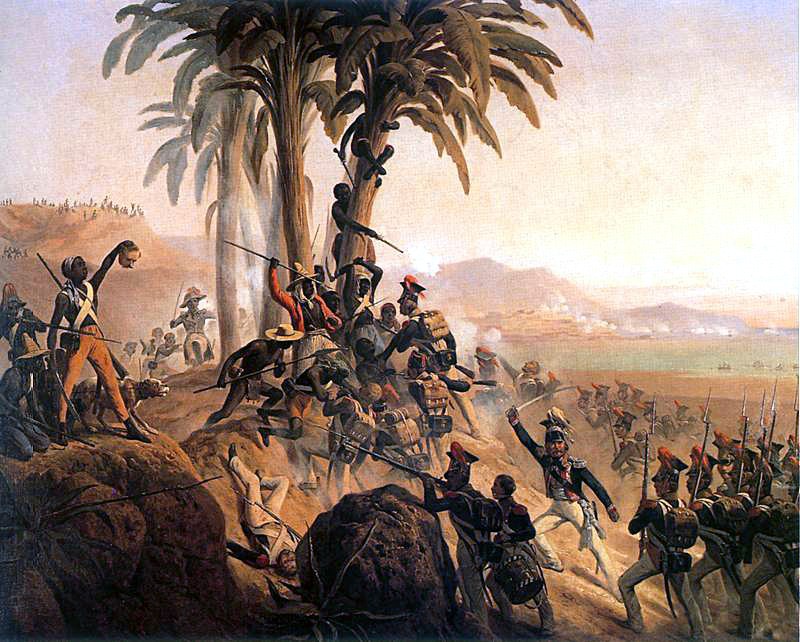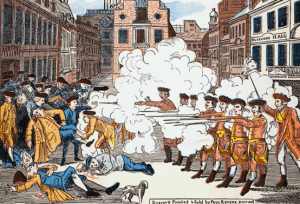The success of the American and the French Revolutions echoed through the people of the new and the old world. These events, powered by the Enlightenment ideas of popular sovereignty, individual freedom, and equality, proved that parting from powerful and oppressive rulers was possible.1 For the first time in recent history, the common man had united and fought for a republic based on the idea and practice of self-rule. This idea of fighting and revolting for independence traveled to slaves on the shores of a Caribbean island where the French had established the colony of Saint-Domingue in 1697.

Saint-Domingue was perhaps one of the most profitable lands that France had in its possession since it produced and exported coffee, indigo, tobacco, cotton, and sugar. The original aboriginal population of the islands had all but disappeared by the time the French had come to the island, and to make use of the colony, the French began to import slaves from Africa to work the fields. It is estimated that by 1789, the colony had a total of 500,000 African slaves, 35,000 white French settlers, and 50,000 colored freedmen who were French citizens and who also owned slaves.2 Despite slaves being the majority of the colony’s population, they lived under a strict and abusive social structure where they worked strenuous jobs under the threat of the whip, and would often starve to death. If runaway slaves were caught, they were often tortured and mutilated in order to dissuade other slaves that there was no escape from the chains of slavery. The daily life for the slaves of Saint-Domingue was one of fear and ill treatment.

French King Louis XIV established the “Code Noir” or Black Codes for the colony, which established rules for the treatment of slaves in all of its French American colonies. The code stated that slave owners were prohibited from sexually violating slaves or from torturing them, and they were required to provide food and clothes to the slaves. Nevertheless, slaves were regarded as property and could receive the death penalty if they did not comply with their masters.3
In 1788, fourteen slaves complained to the court that Nicolas Lejuene, a slave master’s son, would burn slaves alive, and although these acts were clearly violating the law, the courts and public opinion on the Island dismissed Lejuene and he was not prosecuted.4 This incident suggests that laws were not uniformly enforced in the colony, so masters had a free hand in their often atrocious treatments of their slaves. Many slaves ran away from their oppressive masters and hid in the mountains forming large communities of maroons. Their resentment to their French masters only escalated.5

With the ideas of political independence and social revolution circulating the world, slaves in the colony of Saint-Domingue were no longer willing to endure the treatment of their French masters. Tensions in the colony led to a violent uprising. The Haitian Revolution began in August 1791, when about 15,000 slaves destroyed and burned plantations and homes, and murdered white settlers in what was called the “Night of Fire.”6 This event encouraged the educated Catholic and former slave Toussaint L’Ouverture to join the cause. He helped train an army of 50,000 slaves in guerrilla warfare.7 The colony fell into chaos for years as the slaves revolted against French oppression in violent measures, and it was not long before the colony of Saint-Domingue was controlled by the slaves of the island.8

General L’Ouverture allied with the British in order to drive out the French settlers. But unwilling to let go of their colonial power, the French emancipated slaves in 1794; but they were still unable to secure and control the Haitian revolt. By 1803, L’Ouverture had proclaimed himself the governor of the colony, angering the powerful Napoleon Bonaparte who went after L’Ouverture, capturing and imprisoning him. This, however, did not weaken the resolve of the slaves to form an independent state. As Jean-Jacques Dessalines rose to power in the absence of Toussaint L’Ouverture, he ordered the gruesome execution of all Frenchmen in the colony. A year later, in 1804, Haiti was declared independent from French power.9
The slaves of Saint-Domingue were not expected to take on the example of the American colonies and the Enlightenment Era in order to fight for their independence. After the gory and terrible deaths of almost half the population in the colony–including French settlers, free black men and slaves–Haiti stood tall and free, shocking the world.10
- Jerry H. Bentley, Herbert F. Ziegler and Heather E. Streets-Salter, Traditions and Encounters: A Brief Global History Vol 2 (New York: MacGraw-Hill Education, 2016), 471. ↵
- Encyclopedia of Emancipation and Abolition in the Transatlantic World, 2007, s.v. “Haitian Revolution,” by Eugenio Matibag and Junius Rodriguez. ↵
- Philippe R. Girard, “Code Noir,” in Africa and the Americas: Culture, Politics, and History, no.1 (2008): 1. ↵
- Laurie M. Wood, “Across Oceans and Revolutions: Law and Slavery in French Saint-Domingue and Beyond,” Law & Social Inquiry 39, no. 3 (Summer 2014): 5. ↵
- Jerry H. Bentley, Herbert F. Ziegler and Heather E. Streets-Salter, Traditions and Encounters: A Brief Global History Vol 2 (New York: McGraw-Hill Education, 2016), 478-479. ↵
- The Black Past: Remembered and Reclaimed, 2007, s.v. “L’Ouverture Toussaint (1742-1803),” by Deborah McNally. ↵
- J. R. Beard, The Life of Toussaint L’Ouverture, the Negro Patriot of Hayti: Comprising an Account of the Struggle for Liberty in the Island, and a Sketch of Its History to the Present Period (Chapel Hill: University of North Carolina at Chapel Hill Library, 2012), 54. ↵
- Matt Clavin, “Race, Rebellion, and the Gothic: Inventing the Haitian Revolution,” Early American Studies, no. 1 (2007): 5. ↵
- Matt Clavin, “Race, Rebellion, and the Gothic: Inventing the Haitian Revolution.” Early American Studies, no. 1 (2007): 2. ↵
- Matt Clavin “Race, Rebellion, and the Gothic: Inventing the Haitian Revolution.” Early American Studies, no. 1 (2007): 5. ↵



70 comments
Benjamin Voy
This is extremely interesting as I love a good fight against the system story. However it is harrowing to think of all of the ‘slaves’ that were killed during this terrible time. I find it amazing how the Haitians were able to come together and defeat their owners and obliterate slavery in their country and make it what it is today. A well written article with extremely eye-catching images
Eduardo Foster
I didn’t know much about Haiti’s independence. It’s actually an interesting article and about “Noir Code” which I didn’t know it existed. It actually disappointing how they treated slaves. I love how they made the revolt and prepared themselves and actually claim their independence. It’s inspirational how people need to rebel to gain what they deserved. Great article and nice organization in the storytelling.
Justin Garcia
This is a very informative article. I had previous knowledge of this event from world History however that doesn’t take away from how well structured the article is. The article did well to re-inform me of the reasons for the Hawaiian rebellion. How that even with a clear set of rules the french slave owners on the island wouldn’t treat the slaves fairly. The article also told of slave’s trying to speak out against this injustice however with little success. In closing this is just a all round well written article.
Miranda Yzaguirre
It is awful to think about how all over the world people are judged and tortured simply because of the color of their skin. I think it is also weird how there were freedmen living in the same place as people still living in slavery. Having no prior knowledge of this subject, I found this article very informative and interesting. It makes me wonder how the French really did not see this uprising coming and why they thought emancipating the slaves was going to make a difference.
Valeria Hernandez
Ana Gonzalez provides readers with an informative a factual article about the history of Haiti independence. The author manages to remain objective about the events without prejudicing Haiti and the French. She incorporates the testimony of Nicolas Lejeune to intentionally capture the reader’s attention and intensify the tone.
Nahim Rancharan
I loved reading this article especially because of my experience with Caribbean History. Before reading this article I knew quite an amount of information about the Haitian Revolution as well as the seperation of the island between Hispaniola and Sainte-Domingue, which is why there is still quite a bit of French influence in Haiti even up to this day. While this event is one of the more important events in World History, it just comes to show the cycle of how things work and the need for people to have independence. This article was very well organized and perfectly managed to capture the struggles of the people of Hispaniola and their desire to be free from the control of the French, as well as Toussaint L’Overture and Jean Jacques Desssalines’ roles in being victorious in the fight for Hatian Independence.Great Work!
Sergio Cervantes
It is sad to read about the difficulties Haiti’s population faced due to European exploitation. It is interesting to see that France enacted laws to help protect the slaves from abuses but also horrifying to see that they were never supported. It is amazing to see that amidst all that was going on, the population was able to rise up, face their “masters”, and defeat a strong European power. What a shock it must have been to the French to see that they lost an important colony in the Caribbean.
Nicolas McKay
This was an incredible article Ana! This was truly a dark time in human history. It is truly tragic what these slaves were forced to endure. What’s even more incredible is how they were able to rise up and rebel, under the leadership of an extraordinary character like Louverture. While researching for my articel on Jean Lafitte, I discovered one of his rumored origins was him escaping from the Haiti slave revolt. Now i woud very much like to know what happened after and even before the revolt.
Irene Astran
I see you were nominated for the “Best in World History” category, rightfully so I might add. I really enjoyed that you shed light on various aspects such as the black codes and slaves revolting to gain a more favorable stance. I generally enjoy history that sheds light on the oppressed people of color coming to their own, banding together, and attempting to alleviate their people.
Mario De Leon
Great article Ana! I found I very interesting that this slave revolt had stemmed from the French Revolution. It actually ironic that they would be inspired by the French revolution and revolt against the French. Since the slaves were the majority and they were being treated so awfully even when there were laws against mistreating them the revolution was inevitable.